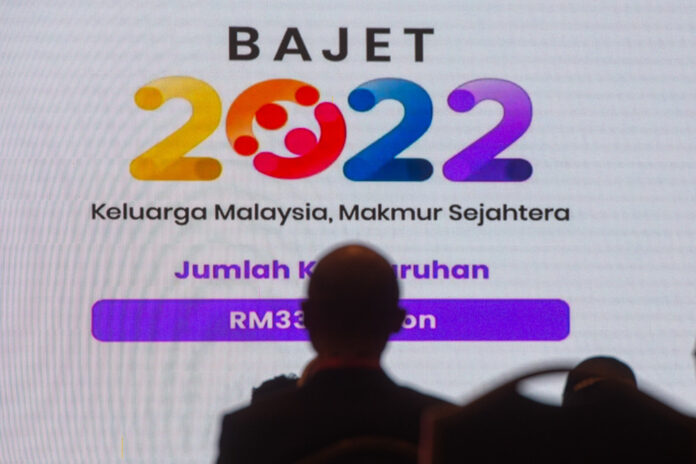Government servants watch Finance Minister Datuk Seri Tengku Zafrul Abdul Aziz speaking during the tabling of Budget 2022 in the Dewan Rakyat, October 29, 2021. — Picture by Shafwan Zaidon
KUALA LUMPUR, OCT 30 — The government’s proposal to impose a one-off surtax on corporations with over RM100 million in chargeable income under Budget 2022 could have long-term ramifications, said economists.
They told Malay Mail that imposing the added tax on companies might prompt the affected companies to increase prices for consumers.
Prof Emeritus Barjoyai Bardai of Universiti Tun Abdul Razak (UniRazak) said the implementation of the windfall tax also appeared hasty, and could have an influence on foreign direct investors’ sentiments.
He explained that companies typically responded to higher taxes by raising prices, effectively transferring the burden to consumers.
“This is in terms of increased prices, so we may expect prices to increase in the near future especially on products from foreign multinational companies,” he told Malay Mail.
Professor Geoffrey Williams of Malaysia University of Science and Technology also disagreed with the new tax, saying it would likely deter investors.
“Windfall taxes should be avoided as a general rule. They don’t raise much revenue and they act as a disincentive to business and investment,” Williams told Malay Mail.
He also questioned the decision to use RM100 million in chargeable income as the threshold for supernormal profits.
“The new threshold of RM100 million is actually very low and for companies and investors, it will be quite a shock and quite disappointing,” Williams said.
Barjoyai explained this threshold could encompass companies selling everyday consumer goods such as food and groceries, potentially motivating them to raise prices.
He noted that companies such as food producers Nestle Malaysia, dairy company Dutch Lady Milk Industries Bhd, and food company Ajinomoto Bhd all post chargeable income above RM100 million annually and would be subjected to the new one-off rate.
He also said the advance warning about the surtax could also give time for companies to restructure their financial operations in order to stay under the RM100 million tripwire.
“I don’t think this step will be productive because it is too easy to just plan the tax, and with this tax, companies with many subsidiaries may just restructure and break the company into two and they will avoid the (RM100 million) threshold,” he said.
The announcement of the windfall tax is set to further increase the government’s revenue dependency on tax-related sources, which the MoF’s Fiscal Outlook and Federal Government Revenue Estimates 2022 report estimated would be RM171.3 billion or 73.2 per cent of the government’s total revenue in 2022.
According to Professor Mohd Nazari Ismail of Universiti Malaya’s Department of Business Strategy and Policy, businesses were just getting into the rhythm after being battered during the pandemic and could do without having to cope with a windfall tax.
“It’s not fair to punish businesses that are doing well. (The government) should only encourage them to voluntarily contribute to Covid-19 funds.
“This way ahead is to reduce government expenditures, and not to punish the business sectors,” he told Malay Mail.
He warned that the move could, in the long run, raise cost of living and cause a vicious cycle of increasing goods and services prices paired with stagnant salary baselines.
Beyond the windfall tax, the experts were generally neutral about Budget 2022.
Williams said despite the needed allocation to try and revive the micro, small, and medium enterprises (MSMEs), the high operational expenditure indicated that not much was done to address the structural issues concerning pensions, welfare, or unemployment.
He also expressed reservations towards the government’s decision to offer discounts to borrowers from the National Higher Education Fund Corporation (PTPTN), saying it was a Band-Aid for the dire and deep-rooted issues within the agency.
“While the government will give between 10-15 per cent discounts on repayment of PTPTN loans, the truth is that this will not address the structural instability in PTPTN, it will increase the costs to government, reduce the repayment income but it will hardly make a difference to lenders.
“It remains structurally unsustainable as PTPTN itself noted in 2019,” he said.
Barjoyai described Budget 2022 overall as populist, in that it was trying to please all sections of society.
He said financial observers had expected an allocation larger than the RM332.1 billion announced considering its main objective to revive the economy.
“Maybe RM332 billion is not a big enough jump as compared to last year’s Budget, especially when you consider that we want to use this as a stimulus to recover from the recession,” he said.
Mohd Nazari predicted that the government would eventually need to reintroduce the goods and services tax (GST) to generate revenue.
However, he acknowledged that trying to bring back the unpopular consumption tax within Budget 2022 would have been political suicide.
“So, this is a Budget to solve a short-term problem and ensure general election victory. This is like ‘kicking the can down the road’, as in to let the future governments deal with the ever-growing debt problem,” he added.


